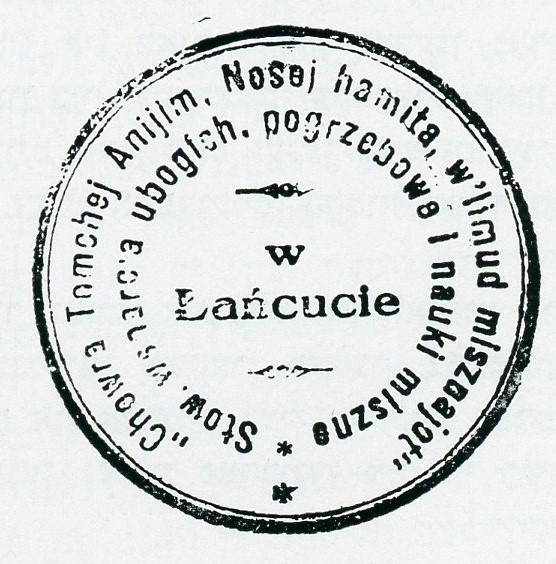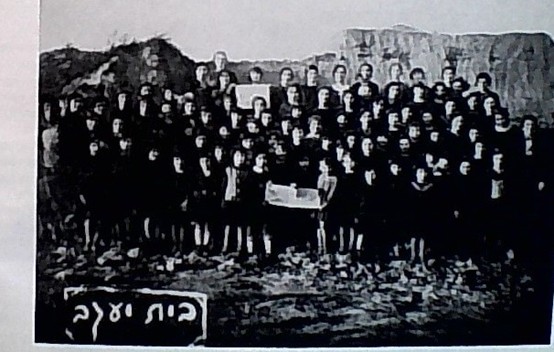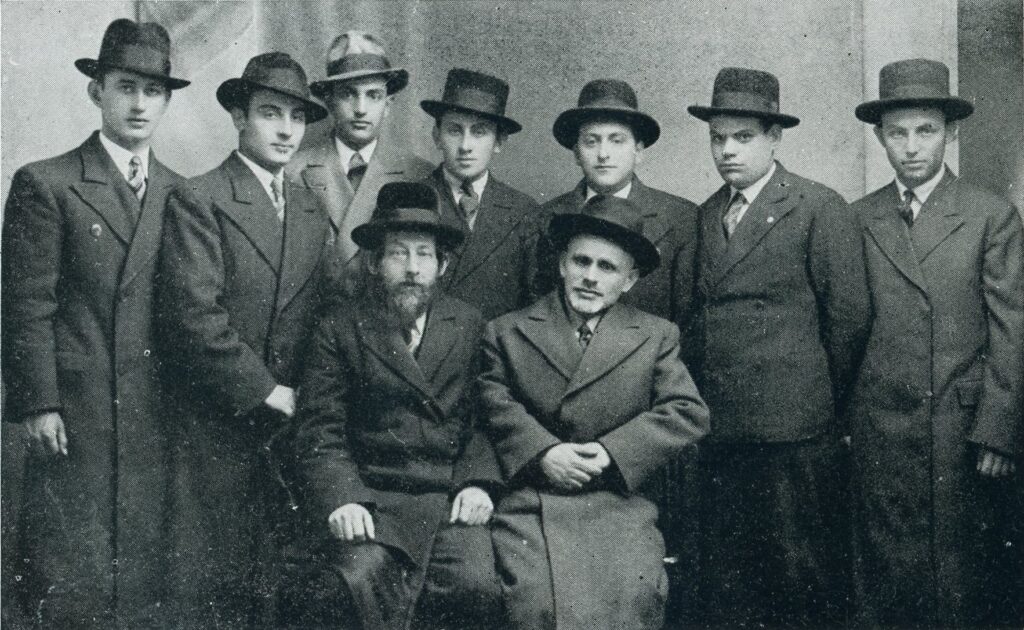Lancut – Part 2
By: Yaakov Rosenfeld
To read part 1, please click here.
To get to know the characters of the town of Lancut, we will bring memories of some of the people from the town, who longed for the magical world that was and is no longer.
When I feel like writing about a character from the Jewish town that was, the figure of my grandfather z”l from Lancut stands before me. I believe that this he was the dearest and best grandfather in the world. But I know that even if I manage to describe his wonderful character, without bias and without letting my emotions overcome me, I will only be able to describe the greatness of the Jewish man in the town, but not his unique character, nor any features that are special to him, and only to him. Should we tell about how he served the Creator? A well-known man who got up every morning at 4 o’clock and went to the great study hall to study and pray? Should we praise his generosity and righteousness, his hospitality, his respect for his students, his distancing himself from lies and slander, his concern for the education of his sons and sons’ sons?
This will be a shining image, but a general one, because he was not unique. Many acted like him in cities and towns in Poland and Galicia, strongholds of Torah, fear of G-d, and Chasidism.

The seal of the Tomchei Ani’im, Nosei HaMita, Ve’Lomdei Mishnayot (Support for the Needy and Burial Society) group in Lancut
The Character of My Grandmother (Elka Breindel Puderweitel, may G-d avenge her blood)
I remember my grandmother in her last 12-13 years. She was no longer young. All of her daughters and most of her sons had left their parents’ home. Most of them had started families and began to earn a living. Along with the hardships of raising children that accompanies parents in educating their children, there was also the hardship of the grandparents. But while my grandfather, at peace with his heart and with his God, looked forward with the trust of a Jew to the future, my grandmother was struggling…
A daughter is about to give birth – my grandmother must, of course, go out, advise, guide, and buy the first gifts. A grandson or granddaughter falls ill – my grandmother immediately stands at the doctor’s right, hurries him along, and when someone is in trouble, she takes the trouble and helps him along. She does not spare her strength until she celebrates her victory over the illness or the pain.
(After the description of the grandmother’s charitable activities within the framework of the Lancut Women’s Association, the grandson tells):
The highlight of her public work was the founding of the Bais Yaakov in the town. She had to fight extremists on both sides, and in the end she succeeded. In addition, she encountered financial difficulties. She fought stubbornly and won. Sarah Schenirer z”l would have been proud of the school and of my grandmother and would have praised the preserverance of this Jewish woman…
(Yitzchak Nevenzahl)

Bais Yaakov in Lancut. Over a hundred students were educated at the school, two years (!) after it opened, in addition to eighty kindergarten students aged 3–6.
These two institutions made a great impression on the Jews of Lanzhut, and one could even say that they sparked a kind of revolution in certain Jewish families…
The girls who studied and were educated at Bais Yaakov acquired knowledge of the Torah, the foundations of Halacha (Jewish law), and acquired a religious and traditional lifestyle. The education of these girls bore fruit. From their ranks came the dedicated activists who participated in all activities for the Agudath Israel, both for the needs of the time and for the needs of the settlement of the land…
(Binyamin Einhorn)
Jewish Strength – A Story
Mendel Sternheim, while in the army, was banned for slapping a Polish sergeant in response to zalled him a “Zyd” (Jew), with the intention of insulting him. He was imprisoned in the Lublin prison and was expected to face a very severe punishment. My grandmother, Elka Breindel Puderweitel, turned to Rabbi Meir Shapira z”l to intervene on his behalf, but he was not successful. My grandmother decided to contact the military attorney…
She said to the military attorney (as I was later told in the Chachmei Lublin Yeshiva, where I was considered a full-time student):
“If you think that saying ‘Zyd’ is less insulting to the soldier than to slap his cheek, it means that you have not risen to the rank of a man of culture, whose weapon is much more refined than brute force. And woe to Polish military law if it is based on such principles…”
(Yitzchak Nevenzahl)
Answerer of Religious Questions and Cantor of the town, Rabbi Yehuda Yaakov Belz, z”l – A Chassid, Righteous Man, and Hospitable Person
Thanks to his good reputation (as a cantor and prayer leader in the city of Przemysl) that preceded Rabbi Yehuda Yaakov, the great Rabbi David Tenenbaum and his deputies Rabbi Chaim Lindenbaum and Rabbi Elimelech Perlmutter were invited by the leaders of the community to come and appear before the devout community rabbi, Rabbi Simcha Shapira z”l, and before the leaders of the community, and on this occasion to pray in the great study hall.
On the Shabbat of Chanuka 5634 (1873), individuals from all the synagogues in the city gathered to listen to his prayers. Chassidim, mitnagdim (opponents of chassidism), and common people praised him.
The Jewish leasdership of the city, with the consent of the Rabbi Simcha Shapira z”l, the rabbi of the community, he was unanimously accepted as a permanent answerer of religious questions in the city of Lancut, a city renowned for its sages, writers, and rabbis, a city that served as a model for small and large cities in central and eastern Galicia. In the month of Adar, 5634, he settled with his entire family in Lancut, where he served as a respected responder to Jewish questions for thirty-seven years.
(…)
Every year, when the month of Elul arrived, there were many preparations in his house.
He prepared his choir for the High Holiday prayers. His singers and assistants were sweet young men, who were members of the study hall, and among them were the notable young men Mordechai Flashen, Yitzchak Wiener, David Wolfman, Yitzhak Zorhaft, and others, who later became leaders of distinguished homes and magnificent prayer leaders.
The pleasant form of his prayer and the melodies that captivated the hearts of his listeners remained the legacy of all the prayer leaders in the city of Lancut even after his passing…
Below are excerpts from the diary of Anshel Katz, a native of Lancut (“Lancut Irati”):
Torah Came before Everything in the Town
There were societies for “hashnasat orchim” (hosting guests) and “bikur cholim” (visiting the ill), “chonen dal” (gracious to the poor) – for passersby, and “tomchei ani’im” (supporters of the poor) for the city’s needy. There were kindness initiatives and Torah studies for poor orphans and children whose parents could not afford to hire teachers. Each society had its role, with old, set regulations.

Members of the Mizrachi leadership in Lancut, seated on the left is Anshel Katz
Regulations that were two hundred years old and more…
…As a merchant and as a cobbler, as a tailor and as a carpenter, as a baker and as a tinsmith, every Jew who makes a living, the head of the community, and every head of a household knows that all wealth and profits are secondary to the Torah.
Katz describes Shabbat in Lancut below:
In winter, before dawn, and in summer after lunch, they gather for Rabbi Wolf Claristenfeld’s lesson, in the packed study hall.
And between Torah portions, Shmeril Shemesh hands out cups of tea and Yankel Anfang pulls a bag of sugar cubes from his kapoteh (chassidic coat) pocket…
In the next chapter, we will continue to present Jewish life in the town of Lancut. In upcoming chapters, we will present:
- Blook libels in Lancut
- Count Potocki, a lover of the Jews
- The synagogue in Lancut
- The bitter storm in a magical Jewish town














